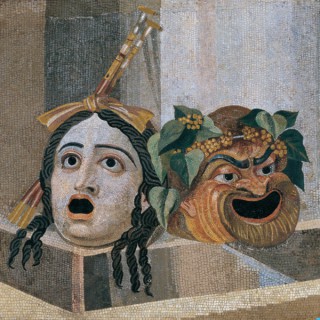Sophocles Antigone in 2019
Follow Sophocles Antigone in 2019An advanced undergraduate Greek class at the University of Texas at Austin reflects on Sophocles' Antigone, and on the experience of teaching it to their classmates. New episodes are released once or twice each week through early December.
- Dec 9, 2019 LATEST EPISODE
- infrequent NEW EPISODES
- 13m AVG DURATION
- 15 EPISODES
Latest episodes from Sophocles Antigone in 2019

Professor Beck returns to wrap things up. Things end well for our podcast series and for the course. For Creon, not so much.

Antigone offers one last lament before going down to her tomb to die. It’s the last thing we’ll ever hear her say. Also, as she leaves the chorus gives a bizarre ode that has left even the top commentators scratching their heads. It’s like no other choral ode we’ve seen, and some scholars have argued that it’s merely garbled filler. But maybe, just maybe, it’s the most genius ode of the entire play.

Nikhil and Payton get together, again, this time to discuss the aspects of conversation between Haemon and Creon.

Lexie discusses the details and importance of Haemon's attempts to dissuade his father, Kreon, from executing Antigone

In this episode, Katherine analyzes the development of the characters Ismene and Antigone in their second exchange during the play as well as the role of "family" in their conflict.

Mary discusses the significance of gender, family, language, and lament in lines 497-530.

Payton and Nikhil have a discussion about what isolation means to some of the main characters in the play. They examine how this passage demonstrates the evolution of these characters to and from isolation.

In this episode, Albion goes over the return of the guard, his new and confident attitude, and how this seemingly minor character contrasts the main characters in a big way.

In this episode, Joseph covers the second half of the Ode to Man in Sophocles' Antigone, lines 354-383. He looks at the meter of the strophe and antistrophe to show Sophocles' theme of duality in the ode and play as a whole he also talks about duality more broadly.

In episode 6, Brendan begins the Ode to Man with a deep discussion on deinos. Performances Referenced: Antigone by Sophocles translated by Robert Fagles [1985] https://www.youtube.com/watch?v=pgAVZcw1b2g Day 2: Antigone in Ferguson Performance: Theater of War ENG https://www.youtube.com/watch?v=u_E8EMcj4lw Music from https://filmmusic.io "Private Reflection" by Kevin MacLeod (https://incompetech.com) License: CC BY (http://creativecommons.org/licenses/by/4.0/) "Thinking Music" by Kevin MacLeod (https://incompetech.com) License: CC BY (http://creativecommons.org/licenses/by/4.0/) "I Knew a Guy" by Kevin MacLeod (https://incompetech.com) License: CC BY (http://creativecommons.org/licenses/by/4.0/)

Episode 5: Discussion of Kreon's Leadership and Modern Interpretation (304-331)
In episode 5, Lyle discusses the nature of Kreon's leadership in lines 304-331 and various aspects of modern interpretations of Antigone with a student of a different academic background.

Laura breaks down Kreon's response to the news that the body of Polynices was burried, discussing both the details of the Greek and the complexity of Kreon's character and motivations.

Dylan McKibban discusses the latter half of Kreon's first speech in the play and how its connections to a previous passage complicate who the hero of the play really is. This is followed by a brief comment on the unusual response the Chorus provides to Kreon's edict.

Classics students Cassandra Winkley and Rachel Prichett discuss the messenger trope in Greek tragedy, and the Guard in Antigone as a pseudo-messenger.

Prof. Deborah Beck introduces the series with a discussion of the characters, language, and themes in the prologue of Sophocles' Antigone.








